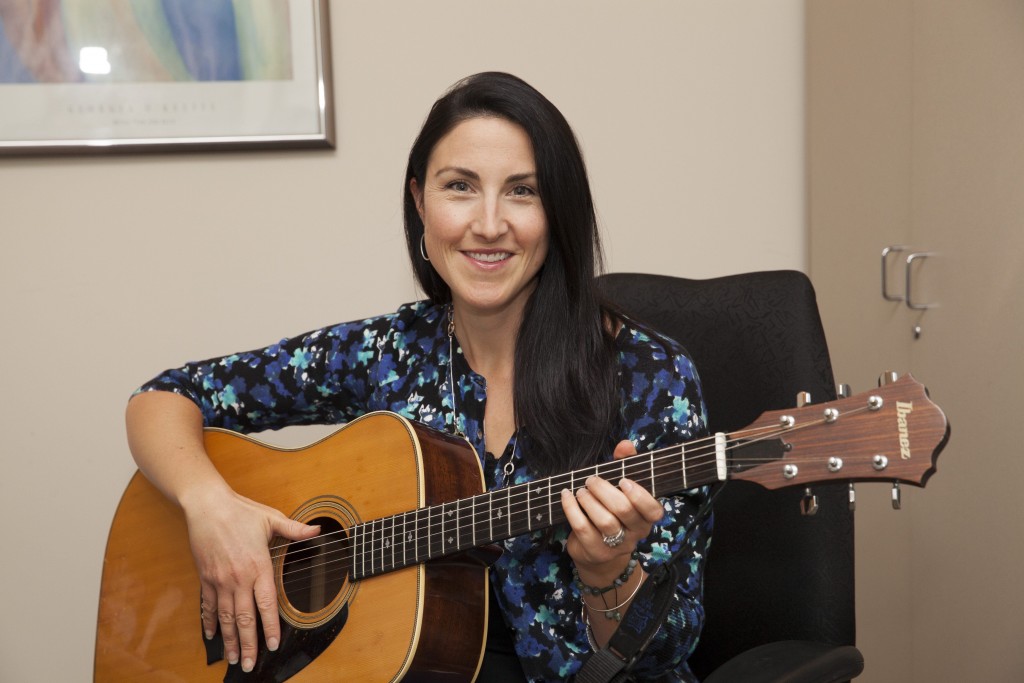This quarter, the spotlight shines on MAR member Leah Oswanski! Please read Leah’s responses listed below to learn more about her; I particularly like her suggestions for novel music therapists and the wisdom she shares in her current goals. Thank you, Leah, for being an amazing MAR member!
Leah Oswanski, MA, LPC, MT-BC
Describe your career as a music therapist—education, populations served, etc.
I have been board certified for (*gulp!*) 14 years this October, with my career focused on adult oncology and EOL/palliative care. I split my undergraduate education between the University of Miami and Montclair State University, which was great because I was able to experience two different MT programs. Following my internship at Memorial Sloan Kettering Cancer Center in NYC, I landed my first job at Cabrini Hospice providing in-home music therapy to clients/families in four of the five NYC boroughs. While at Cabrini I began consulting at the Carol G. Simon Cancer Center, which is part of Morristown Medical Center in NJ. I left Cabrini when my program, the Jeffrey Frank Wacks Music Therapy Program, took off and became a full time gig. I eventually went on to pursue a MA in Counseling from Montclair State University, and became an LPC in NJ.
What brought you to the field of music therapy or why did you decide to pursue music therapy as a profession?
I had no idea in high school that music therapy was a career choice. It was never mentioned. I was a sophomore at the University of Miami on a musical theatre scholarship and Dr. Ted Tims , MT-BC held a program on music therapy one night at my dorm. I was immediately hooked and thought, “this is what I always wanted to do—I had no idea that this was an actual degree!!” Within a month, I had changed my major and the rest is history.
What suggestions do you have for novice music therapists?
Don’t get hung up on being defensive with people who don’t understand what we do. It’s certainly annoying, but if you are confident in your work and who you are it’s easier to be calm during each teachable moment that you encounter. If you need constant external validation of your work, this field will be very difficult on you. Make it internal- and you will survive all the ups and downs.
Tell us about one of your most favorite moments of being a music therapist.
I love what I do. Sometimes I am shocked that I still love it so much after all of these years. To pick a clinical moment is impossible, as there are so many amazing experiences in my mind. My favorite moment, outside of clinical, has been my involvement in the LIVESTRONG Community Impact Project grant. In 2014, LIVESTRONG choose my oncology MT program as a model and distributed over $250,000 between 13 hospitals across the country to start mini versions of it. I was hired by LIVESTRONG to be the consultant for all 13 hospitals on both the administrative and clinical level. It was the most challenging professional experience of my career, but seeing the programs flourish and thrive has been incredible. Of the 13 sites, 11 have committed to keep or even expand the position. Fourteen years ago, the Jeffrey Wacks Memorial Fund gave me a chance to show the oncology community at Morristown Medical Center what music therapy can offer. “Seeing is believing”- so the program has continued to grow- but only because an outside source funded my initial work. There are so many incredible music therapists on the LIVESTRONG project that just needed that one source of funding to get their foot in the door. I am in awe of all that they have created with that opportunity, and participating in their experience has absolutely been a highlight of my career.
What goals do you have for the next few years?
My goal is to have a decent work/life balance. This appears impossible for me with two small children, but it is still my goal. That being said– my kids will only be young once so my priorities are clear in my life at this point. If there is one thing I have learned over my years of practice it is that we only have the present moment. Tomorrow may not appear, or if it appears it may not appear as you plan. The time is now.

